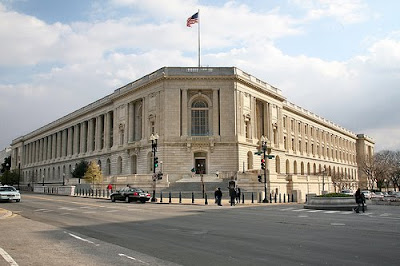AANP President
 The Cannon House Office Building on Capitol Hill.
The Cannon House Office Building on Capitol Hill.
Photo by cliff1066TM via Flickr, used under the Creative Commons License.
I’m sure you have read Karen Howard’s report on this year’s DC FLI. It was a busy four days in Washington, D.C., as over 150 people, including more than 100 naturopathic medical students, met on Capitol Hill to refine our leadership skills, meet with legislators and their staff, and create a visible presence in our nation’s capital. For a profession as small as ours, we have managed become known in the Halls of Congress. This year was my 3rd DC FLI, and I noticed that we spent much less time explaining what naturopathic medicine is and who we are and more time discussing issues important to our profession, our members and our patients.
One of our key messages involved inclusion of naturopathic doctors in various loan repayment programs created or extended under the new Patient Protection and Affordable Care Act. It’s ironic really. Both the Department of Education and the Carnegie Institute classify the ND degree as a First-Professional Degree on par with MDs and DOs. All naturopathic medical schools are accredited by the CNME which is recognized by the Department of Education and each of our schools are regionally accredited by authorities recognized by the Dept. of Ed. Naturopathic medical students are eligible for the same federal loan programs as MDs and DOs. Yet, naturopathic doctors are not named in a number of federal programs which allow us to serve in underserved communities and are excluded from participation in all federal loan repayment programs, including the Public Health Workforce, the National Health Services Corp, and the Indian Health Care Improvement Act. This is clearly unfair and is a significant barrier to NDs participating in federal programs, and in the meetings I attended, this was clearly heard by the health staff people with whom we spoke.
Our doctors and students also advocated for a consensus definition of “Integrative Health Practitioner,” a term used but left undefined in the health care reform language, and reminded legislators of our support for DSHEA, which frequently comes under attack from various legislators and agencies.
I think that at least as important as our messages and issues discussed is our presence in D.C. and the building of relationships with legislators, their staffs, and the various regulatory agencies that oversee the transformation of bill language into laws.
On another note, members of the AANP should be receiving their elections packets from the AANP very soon. This year a number of candidates have stepped up for Board positions and for the first time ever we have a competitive election for AANP President-Elect. I am impressed by the quality of our candidates and the wealth of experience, knowledge and dedication to the profession that they all bring to their candidacies. Please read over the candidates' statements and vote for your choice of our next AANP leaders. Your interest and participation are critical to the future of the AANP.
Finally, watch for materials coming soon about the AANP convention in Portland, August 11th-15th. It should be a great one as we celebrate the AANP's 25th anniversary, learn from some of the elders in our profession, and spend time with old and new friends. I hope to see all of you there.




No comments:
Post a Comment